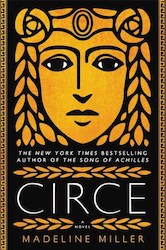
In her first novel, The Song of Achilles, Madeline Miller retells the story of Achilles, Greece’s best warrior from his youth to his part in the decade-long siege of Troy.
In her new novel, Miller turns from Homer’s The Iliad to The Odyssey and the story of the goddess Circe. In Homer, Circe only appears in the middle two books of the epic poem (books 10-11), but Miller expands Circe’s story far beyond that single episode of the year that Odysseus and his crew spend on the island of Aiaia.
Circe is the youngest daughter of the sun god Helios. She’s very much the forgotten child in the family until she discovers an affinity for flowers and herbs and their properties. She turns one of the nymphs, Scylla, into the hideous six-headed monster we meet in The Odyssey because Scylla had lured away Circe’s love interest, Glaucos.
Although no one believes Circe could have been responsible initially, when Zeus and her father realize the truth, Circe is exiled to Aiaia, and that’s when her story really begins. The rest of the novel is the chronicle of the interactions she has with gods and mortals who come to Aiaia, including Hermes, Athena, Daedalus, Odysseus, and ultimately, Penelope and Telemachus.
Because Homer’s account of Circe in The Odyssey is so sparse–just the single year with Odysseus–Miller has far more room for invention than she did in The Song of Achilles, which draws on a much fuller account of his story in Homer’s The Iliad.
As a result, Miller has room to develop what might be considered a feminist reinterpretation of the Greek gods and the societies devoted to them. Much of the novel is Circe’s journey to discover exactly whom she should be. What exactly does it mean in this world to be a goddess, a woman, a wife, a mother? In addition, she explores the ideas of fate and free will as Circe and mortals face dilemmas.
I think of the two novels, I prefer the first, but both novels are excellent and I would recommend them highly. What’s even better is that readers with no direct knowledge of Homer’s accounts will still be able to enjoy these stories. Miller makes the connections one needs to come to these stories for the first time. That’s an accomplishment of some merit for a mythology as rich and diverse as this is.
If I could have Hermes deliver a message directly to Miller, I’d have him request that she turn her attention to the stories of Rome next.
In her new novel, Miller turns from Homer’s The Iliad to The Odyssey and the story of the goddess Circe. In Homer, Circe only appears in the middle two books of the epic poem (books 10-11), but Miller expands Circe’s story far beyond that single episode of the year that Odysseus and his crew spend on the island of Aiaia.
Circe is the youngest daughter of the sun god Helios. She’s very much the forgotten child in the family until she discovers an affinity for flowers and herbs and their properties. She turns one of the nymphs, Scylla, into the hideous six-headed monster we meet in The Odyssey because Scylla had lured away Circe’s love interest, Glaucos.
Although no one believes Circe could have been responsible initially, when Zeus and her father realize the truth, Circe is exiled to Aiaia, and that’s when her story really begins. The rest of the novel is the chronicle of the interactions she has with gods and mortals who come to Aiaia, including Hermes, Athena, Daedalus, Odysseus, and ultimately, Penelope and Telemachus.
Because Homer’s account of Circe in The Odyssey is so sparse–just the single year with Odysseus–Miller has far more room for invention than she did in The Song of Achilles, which draws on a much fuller account of his story in Homer’s The Iliad.
As a result, Miller has room to develop what might be considered a feminist reinterpretation of the Greek gods and the societies devoted to them. Much of the novel is Circe’s journey to discover exactly whom she should be. What exactly does it mean in this world to be a goddess, a woman, a wife, a mother? In addition, she explores the ideas of fate and free will as Circe and mortals face dilemmas.
I think of the two novels, I prefer the first, but both novels are excellent and I would recommend them highly. What’s even better is that readers with no direct knowledge of Homer’s accounts will still be able to enjoy these stories. Miller makes the connections one needs to come to these stories for the first time. That’s an accomplishment of some merit for a mythology as rich and diverse as this is.
If I could have Hermes deliver a message directly to Miller, I’d have him request that she turn her attention to the stories of Rome next.
 RSS Feed
RSS Feed
